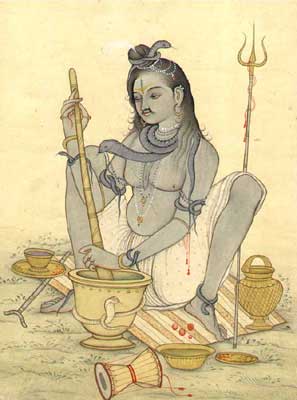
The "Great Aranyaka Upanisad" occurs as the last section of Satapatha Brahmana of the Sukla Yajurveda. At once an aranyaka and an upanisad, it illustrates well the position of the older upanisads within the vedic corpus. This section, like much of the brahmana literature, uses myth to explain an imponderable question, in this case the creation of the world. Translated from the Sanskrit by Purohit Swami and W. B. Yeats.
In the beginning all things were Self, in the shape of personality. He looked around, saw nothing but Himself. The first thing he said was, "It is I." Hence "I" became His name. Therefore even now if you ask a man who he is, he first says, "It is I", and gives what other name he has. He is the eldest of all. Because he destroyed all evil, he is called the first Person. He who knows this, destroys all evil, takes the first rank.
He became afraid; loneliness creates fear. He thought: "As there is nothing but myself, why should I be afraid?" Then his fear passed away; there was nothing to fear, fear comes when there is a second.
As a lonely man is unhappy, so he was unhappy. He wanted a companion. He was as big as man and wife together; He divided himself into two, husband and wife were born.
Yadnyawalkya said: "Man is only half himself; his wife is the other half."
They joined and mankind was born.
She thought: "He shall not have me again; he has created me from himself; I will hide myself." She then became a cow, he became a bull; they joined and cattle were born. She became a mare, he a stallion; she became a she-ass, he an ass; they joined and the hoofed animals were born. She became a she-goat, he a goat; she became a ewe, he a ram; they joined and goats and sheep were born. Thus He created everything down to ants, male and female.
Then he put his hand into his mouth and there created fire as if he were churning butter. He knew that He was this creation; that He created it from Himself; that He was the cause. Who knows, finds creation joyful.
When they say: "Sacrifice to this or that god," they talk of separate gods; but all gods are created by Him, and He is all gods.
Whatever is liquid He created from His seed. Everything in this world is eater or eaten. The seed is food and fire is eater.
He created the gods; created mortal men, created the immortals. Hence this creation is a miracle. He who knows, finds this miracle joyful.
This world was everywhere the same till name and shape began; then one could say: "He has such a name and such a shape." Even today everything is made different by name and shape. Self entered into everything, even the tips of fingernails. He is hidden like the razor in its case. Though He lives in this world and maintains it, the ignorant cannot see Him.
When he is breathing, they name Him breath; when speaking, they name Him speech; when seeing, they name Him eye; when hearing, they name Him ear; when thinking, they name Him mind. He is not wholly there. All these names are the names of His actions.
He who worships Him as the one or the other is ignorant, is imperfect; though he attains completely one or the other perfection. Let him worship Him as Self, where all these become the whole.
This Self brings everything; for thereby everything is known. He is the footprint that brings a man to his goal. He who knows this attains name and fame.
This Self is nearer than all else; dearer than son, dearer than wealth, dearer than anything. If a man call anything dearer than Self, say that he will lose what is dear; of a certainty he will lose it; for Self is God. Therefore one should worship Self as Love. Who worships Self as Love, his love never shall perish.
It is said everything can be got through the knowledge of Spirit. What is that knowledge?
In the beginning there was Spirit. It knew itself as Spirit; from that knowledge everything sprang up. Whosoever among gods, sages and men, got that knowledge, became Spirit itself. Sage Wamadewa knew it and sang "I was Manu; I was the sun."
Even today he who knows that he is Spirit, becomes Spirit, becomes everything; neither gods nor men can prevent him, for he has become themselves.
From the book Indian religions: a historical reader of spiritual expression amd experience / edited by Peter Heehs

No comments:
Post a Comment